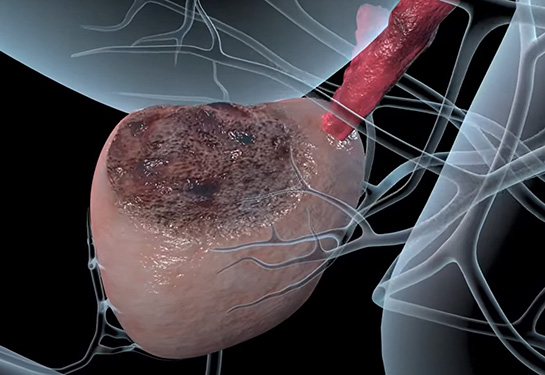Urologic Infections and Inflammation
Chronic infections and inflammation in your urinary tract can affect your everyday life. Our urologists have extensive expertise in diagnosing and treating these issues.
Medically reviewed by Marc Dall'Era, M.D. on Aug. 23, 2023.

Expert Treatment for Urologic Infections
At UC Davis Health, our primary care providers frequently treat urologic infections. When needed, they call upon the skill and experience of our urologists, whose specialty training provides a higher level of care.
Types of Urologic Infections and Inflammation
Infections can occur nearly anywhere in the urinary tract or male reproductive system. Bacteria cause most urologic infections. Inflammation is your body’s response to infections or other harmful agents.
The main types of urologic infections and inflammation include:
- Urinary tract infection (UTI): Infection in any part of your urinary tract
- Cystitis: Infection of the bladder (the most common type of UTI)
- Interstitial Cystitis: Chronic inflammation of the bladder walls that can cause scarring and severe pain
- Pyelonephritis: Kidney infection
- Urethritis: Inflammation of the urethra, the tube that carries urine from your bladder to outside your body
- Epididymitis: Inflammation of the epididymis, the coiled tube at the back of each testicle that carries sperm
- Prostatitis: Inflammation of the prostate, the gland behind your penis that produces semen
Symptoms of Urologic Infections and Inflammation
Symptoms vary depending on the type of urologic infection or inflammation and whether it is acute (sudden) or chronic (long term).
Common Symptoms
The general symptoms of urologic infections and inflammation include:
- Pain in the area of the infection or inflammation (lower abdomen, lower back, side, penis or scrotum)
- Burning during urination
- Frequent urination or constantly feeling like you have to go
- Urine that is dark-colored or has a foul odor
- Discharge from the vagina or penis
- Tender and swollen testicle
Emergency Symptoms
Severe urologic infections can spread and become dangerous. Seek medical care right away if you experience:
- Confusion
- Fever (above 100 degrees F) and chills
- Nausea and vomiting
- Shortness of breath
- Severe pain
Causes of Urologic Infections and Inflammation
Bacteria are the most common cause of urologic infections.
The routine flow of urine through your urethra usually keeps bacteria from entering your urinary tract. But sometimes, the infection moves up your urethra to your bladder and even to your kidneys. In men, bacteria can also travel from the urethra to the epididymis and prostate.
Inflammation is usually a result of an infection. Other causes of inflammation include injury or trauma to your urethra, prostate or epididymis.
Bacteria From Your Body
Urologic infections usually stem from bacteria that naturally live in your colon or vagina. The bacteria can also come from infections that spread from somewhere else in your body.
Sexually Transmitted Infections
Bacteria introduced to your body through sexual activity can cause sexually transmitted infections (STIs). Urologic issues are a common symptom of STIs.
Risk Factors for Urologic Infections
Risk factors vary between the different types of urologic conditions. Some common risk factors include:
Antibiotic Use
Antibiotics for another infection can wipe out good vaginal bacteria, increasing the number of UTI-causing bacteria.
Biological Sex
UTIs are more common in women because they have a short urethra that is relatively close to their anus.
Previous Urologic Infection
Your risk of getting a urologic infection is higher if you’ve had that same infection previously.
Recent Medical Care
Urologic surgery or a catheter (a tube inserted into your bladder to help you urinate) can raise your UTI risk.
Sexual Activity
Frequent sex, unprotected sex and multiple sex partners increase your risk of urologic infections.
Spermicide Use
The use of spermicide with a diaphragm for birth control is linked to UTIs.
Urinary Tract Problems
Stones or structural problems can slow urine drainage, increasing the chance that bacteria will grow.
Diagnosing Urologic Infections and Inflammation
Diagnosis typically involves a review of your symptoms, medical history and risk factors. Your provider will also perform a physical exam and order one or more tests.
Your physical exam may include a pelvic exam if you are a woman. If you are a man, your provider may check your penis and scrotum and perform a digital rectal exam to feel your prostate.
Tests your provider may order include:
- Urinalysis: This test looks for bacteria, red blood cells and infection-fighting white blood cells in your urine.
- Urine culture: This test identifies the type of bacteria causing the infection. Knowing the type helps your provider determine the best antibiotic to use. Results usually take about 2 days.
- Blood tests: A blood culture looks for bacteria in your blood or other problems related to your UTI.
- Semen analysis: You collect semen in a special container. A laboratory analyzes the semen for blood or other signs of infection.
- Imaging tests: X-rays, ultrasound, MRI, and CT scans can help your provider diagnose a problem or rule out other conditions.
- Urodynamic testing: This group of tests measures the flow of urine into and out of your bladder.
- Cystoscopy: In this test, your provider uses a thin tube with a camera to look inside your bladder.
Treating Urologic Infections and Inflammation
Treating minor UTIs and STIs is typically straightforward. Your primary care provider may prescribe you medication or recommend at-home treatments.
Our urologists offer specialized care for urologic infections and inflammatory conditions that are complicated, severe or don’t go away. You may also see a urologist if you have underlying health conditions or urologic abnormalities.
UC Davis Health urologists follow you closely to make sure treatment is effective. For chronic conditions, we work with you to ease pain and other symptoms. Our goal is to help you live a full, active life.
Antibiotics
Antibiotics are the main treatment for urologic infections. Usually, you take these by mouth. If you are very sick, you may go to a hospital to receive intravenous (IV) antibiotics.
Pain Medication
Providers typically treat pain with nonsteroidal anti-inflammatory drugs (NSAIDs). For chronic pain, we may refer you to a pain management specialist.
Lifestyle Modifications
Your provider may suggest lifestyle changes to reduce your risk of repeat UTIs or STIs. These may include improving your hygiene, practicing safe sex, routine STI testing or changing your birth control.
At-Home Treatments
Your provider may recommend at-home treatments that can help speed healing and relieve symptoms. Increasing fluids can help flush bacteria out of your urinary tract. Rest, heat or ice may help reduce certain symptoms of epididymitis and prostatitis.
Intravesical Therapy
Interstitial cystitis is often difficult to treat. Intravesical therapy can offer relief when other treatments are not successful. In this procedure, we place anti-inflammatory or anesthetic medications directly inside your bladder.
Preventing Urologic Infections and Inflammation
You cannot prevent all urologic infections and inflammatory conditions. But drinking more fluid can help flush bacteria out of your urinary tract and lower your risk of infection.
Women should also:
- Select a birth control method other than a diaphragm with spermicide
- Urinate after sex
- Wipe from front to back
Condom use and routine STI testing are also important if you have multiple sex partners.
UTIs in women
40%Of U.S. women will have a UTI in their lifetime
Epididymitis in men
600KU.S. men are affected by epididymitis each year
Urethritis in men and women
4MNew cases occur in the U.S. each year
Sources: Bono MJ, Leslie SW, Reygaert WC, et al. In: StatPearls: Urinary Tract Infection (Nursing)
Rupp TJ, Leslie SW. In: StatPearls: Epididymitis
Young A, Toncar A, Wray AA. In: StatPearls: Urethritis
Request an Appointment
As Sacramento's No. 1 hospital, you'll benefit from unique advantages in primary care and specialty care. This includes prevention, diagnosis and treatment options from experts in 150 specialties.
Referring Physicians
To refer a patient, submit an electronic referral form or call.
800-4-UCDAVIS
Patients
Call to make an appointment.
Consumer Resource Center
800-2-UCDAVIS

Ranked among the nation’s best hospitals
A U.S. News & World Report best hospital in cardiology, heart & vascular surgery, diabetes & endocrinology, ENT, geriatrics, neurology & neurosurgery, and pulmonology & lung surgery.

Ranked among the nation’s best children’s hospitals
U.S. News & World Report ranked UC Davis Children’s Hospital among the best in pediatric nephrology, orthopedics*, and pulmonology & lung surgery. (*Together with Shriners Children’s Northern California)

Ranked Sacramento’s #1 hospital
Ranked Sacramento’s #1 hospital by U.S. News, and high-performing in aortic valve surgery, back surgery (spinal fusion), COPD, colon cancer surgery, diabetes, gynecological cancer surgery, heart arrhythmia, heart failure, kidney failure, leukemia, lymphoma & myeloma, lung cancer surgery, pacemaker implantation, pneumonia, prostate cancer surgery, stroke, TAVR, cancer, orthopedics, gastroenterology & GI surgery, and urology.

The nation’s highest nursing honor
UC Davis Medical Center has received Magnet® recognition, the nation’s highest honor for nursing excellence.

World-class cancer care
One of ~59 U.S. cancer centers designated “comprehensive” by the National Cancer Institute.

A leader in health care equality
For the 13th consecutive year, UC Davis Medical Center has been recognized as an LGBTQ+ Healthcare Equality Leader by the educational arm of America’s largest civil rights organization.

